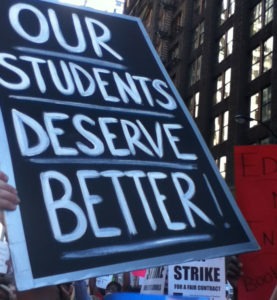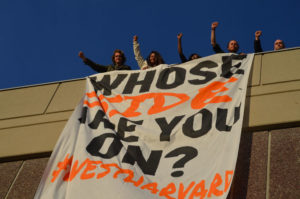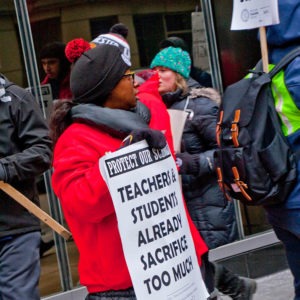
April 2, 2018; New York Times
Teachers in Oklahoma, Arizona, and Kentucky are following West Virginia’s lead and striking for better pay and education funding. Leading the effort are young, activist-inspired colleagues, who have had enough with low pay and deteriorating working conditions. As Dana Goldstein writes in the New York Times, “pent-up rage over years of pay freezes and budget cuts” is fueling the walkouts.
The only surprising thing about the Oklahoma teachers’ strike is that it’s taken so long to get here. NPQ reported in August on the miserable state of Oklahoma’s school system. With a state $900 million in debt and the second-lowest teacher pay in the nation, the Sooner State was relying on community supports like the Kaiser Foundation to help keep teachers working in the state. Even that was not enough, and over 1,400 positions were filled by “emergency certified” teachers, whom Newcastle superintendent Tony O’Brien described as “upright and breathing.” Nearly 20 percent of schools switched to four-day weeks to cut costs, even though pay was so low that some teachers were donating plasma to pay their bills.
NPQ’s Marty Levine reported in 2016 that “between 1996 and 2015, after adjusting for inflation, public school teachers saw their pay decrease by $30 a week while the weekly pay for college graduates overall grew by more than $100.” Oklahoma’s teachers are striking for a $20,000 raise and an increase in funding for buses, custodians, and textbooks. According to Vox,
Last week, Oklahoma legislators passed a $447 million compromise to boost teacher pay and school funding by raising taxes on oil production, diesel fuel, and cigarettes. But that was only a fraction of the $3.3 billion requested by the teachers, and the Oklahoma Education Association—the professional educators’ group that is leading negotiations—rejected the deal.
Jami Cole, a third-grade teacher, said the bill “just broke my heart.” Alberto Morejon, the 25-year-old middle school social studies teacher who started a Facebook group to organize the walkout, had a different approach; he said, “They had to make us go to the extreme and now they’re just trying to throw a Band-Aid on it and it’s just not going to work.” As of Monday night, Morejon’s Facebook group had over 61,000 members.
Noah Karvelis, an elementary school music teacher in Arizona and leader of the movement calling itself #RedforEd (because of the red t-shirts worn by protestors), said, “Our unions have been weakened so much that a lot of teachers don’t have faith.” That situation is not likely to improve after the Supreme Court decides the Janus case, which many fear will weaken labor unions across the country. Should Janus be decided against the unions, public sector unions throughout the US could be forced to operate under so-called “right to work” rules, which compel unions to provide services to all workers, whether or not they pay dues. Such a decision would both weaken unions economically and also could have major political effects. A Nation article cited a recent Brookings study that found that nationally “Right-to-work laws decreased Democratic presidential vote share by 3.5 percent.”
Sign up for our free newsletters
Subscribe to NPQ's newsletters to have our top stories delivered directly to your inbox.
By signing up, you agree to our privacy policy and terms of use, and to receive messages from NPQ and our partners.
The unions supported the teachers while steering clear of directly organizing the wildcats. Wildcat strikes have come back into favor in recent years, spurred by the fact that unions through collective bargaining often lack the power to negotiate the wages and working conditions their members believe they deserve. National Education Association Vice President Becky Pringle joined protestors in Kentucky, saying:
You are in the front of the lines to ensure your students have the kind of education that inspires their imaginations and unleashes their brilliance. So, don’t be shy about your business. Don’t be afraid of your power. My question this morning to you is, “What are you prepared to do?”
NEA President Lily Eskelsen García added, “This is a man-made crisis…You are part of a movement that cannot be stopped.” García dubbed the movement America’s “education spring” and added that the walkouts are “the civics lesson of our time.”
Other nonprofits have stepped in to help support the teachers by providing services to students that they would normally get in school. Over 400,000 Oklahoma students get free or reduced priced lunches, for instance, so food banks stocked up to help fill the gaps while schools were closed. The Oklahoma Institute for Child Advocacy offered to serve as an information checkpoint for parents looking for services.
Even the students joined in. Raylynn Thomas, 16, whom the Washington Post described as a “top student,” said her history book stopped with Barack Obama’s inauguration and the ceiling of her classroom leaked onto the desks in the rain. “It’s just making it really hard for me to go school,” she said, so she got on a bus to join her teachers at the capital.
Across the country, we are seeing a pattern of young people taking charge of their communities and leading the way to the change that many others hope for; the upsurge in labor activism is related to the rise of social justice movements nationally. Of course, such activism is not without risk. For example, the young activists leading the #BlackLivesMatter and other protest movements centered on racial justice have often been portrayed negatively in the press and have sometimes been victims of attempts at reform. The teachers in Oklahoma face risks, too. As a local Oklahoma teacher’s union president acknowledges, a walkout is a test of nerves—and people’s paychecks are very much on the line. There’s a reason that a former national steelworker president titled his memoirs One Day Longer. Still, the teachers are going into this, eyes wide open. After years of debate about school reform, school choice, teacher assessment, and other buzzword solutions, teachers are weighing in, signs in hand.—Erin Rubin













